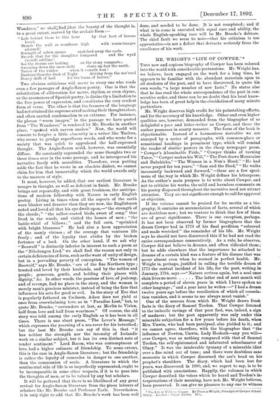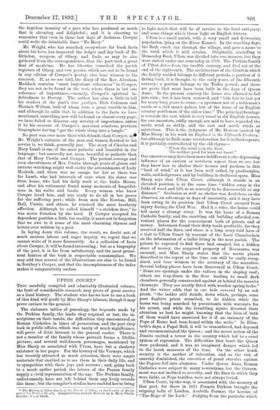MR. WRIGHT'S "LIFE OF COWPER."* THIS new and copious biography
of Cowper has been ushered into the world with considerable pretensions. Mr. Wright has, we believe, been engaged on the work for a long time, he appears to be familiar with the abundant materials open to all students of the poet, and to have discovered, to quote his own words, "a large number of new facts." He states also that he has read the whole correspondence of the poet in con- secutive order, and there can be no doubt that his local know- ledge has been of great help in the elucidation of many minute particulars.
Mr. Wright deserves high credit for his painstaking efforts, and for the accuracy of his knowledge. Other and even higher qualities are, however, demanded from the biographer of so delightful a poet and letter-writer as Cowper, and these the author possesses in scanty measure. The form of the book is objectionable. Instead of a harmonious narrative we are annoyed by a series of paragraphs, with common-place or sensational headings in prominent type, which will remind the reader of similar posters in the cheap newspaper press. " Cowper's Abominable Pride," " Cowper thinks of turning Tutor," "Cowper makes his Will," " The Poet draws Mountains and Dabchicks," " The Woman in a Nun's Hood," "He had never prayed for ten years," " Sam and the Shed," " He walks incessantly backward and forward,"—these are a few speci- mens of the:way in which Mr. Wright defines his letterpress. As the author's main purpose is to write about Cowper, and not to criticise his works, the mild and harmless comments on his poetry dispersed throughout the narrative need not attract attention. They are not significant enough to call for approval or objection.
If the volume cannot be praised for its merits as a bio- graphy, it contains an accumulation of facts, several of which are doubtless new ; but we venture to think that few of them are of great significance. There is one exception, perhaps. It has not been observed by former biographers that the dream Cowper had in 1773 of his final perdition "coloured and made wretched" the remainder of his life. Mr. Wright says he should not have discovered this if he had not read the entire correspondence consecutively. As a rule, he observes, Cowper did not believe in dreams, and often ridiculed them; but he adds elsewhere that the importance he attached to dreams of a certain kind was a feature of his disease that was never absent even when he seemed in perfect health. Mr. Wright is, perhaps, justified in calling the terrible dream of 1773 the central incident of his life, for the poet, writing in January, 1784, says :—" Nature revives again, but a soul once slain lives no more The latter end of next month will complete a period of eleven years in which I have spoken no other language ; " and a year later he writes :—" I had a dream twelve years ago before the recollection of which all consola- tion vanishes, and it seems to me always must vanish?'
One of the sources from which Mr. Wright draws fresh facts is the diary of Samuel Teedon. That Cowper listened to the imbecile ravings of that poor fool, was, indeed, a sign of madness; but the poet apparently was only under this miserable subjection for a few years before his death, when Mrs. Unwin, who had been paralysed, also yielded to it; and we cannot agree, therefore, with the biographer that " the influence of Newton, Unwin, Lady Hesketh—any you will— over Cowper, was as nothing compared with that of Samuel Teedon, the self-opinionated and infatuated schoolmaster of Olney." It was the intolerable tyranny of a miserable idiot over a fine mind out of tune; and there were doubtless sane moments in which Cowper discerned the ass's head on his prophet's shoulders. The diary, which had been lost for years, was discovered in 1890, and, we regret to say, is to be published with annotations. Happily, the volumes in which
Cowper described the voices which he heard and Teedon's in- terpretations of their meaning, have not, Mr. Wright believes, been preserved. It can give no pleasure to any one to witness * Tie Life of WilZia m Cowper. By Thom is Wright, Principal of Cowper School Olney. London Fisher Uawin.
the hopeless insanity of a poet who has produced so much that is elevating and delightful ; and it is cheering to remember that even in those last days of darkness Cowper could write the inimitable lines " To Mary."
Mr. Wright, who has searched everywhere for fresh facts about his hero, has inspected the ledger and day-book of Dr. Grindon, surgeon, of Olney, and finds, as may be also gathered from the correspondence, that the poet took a great deal of medicine. He has likewise consulted the parish registers of Olney, and two poems, which are not to be found in any edition of Cowper's poetry, also bear witness to his research. If, as we are told, the diary of the Rev. Abraham Maddock contains " most important references " to Cowper, they are not to be found in the text, where there is but one reference of importance,—namely, Cowper's spiritual in- debtedness to Hervey. The author has also a little to tell his readers of the poet's two proteges, Dick Coleman and Hannah Willson, both of whom were a great trouble to him, and although he adds that, in addition to the facts we have mentioned, something new will be found on almost every page, we have failed to discover any novelty of importance, unless it be his account of Cowper's maternal relatives, previous biographers having " got the whole thing into a tangle."
No poet was ever more blest with friends than Cowper, al* Mr. Wright's estimate of the men and women devoted to his service is, we think, generally just. The story of Charles and Mary Lamb is one of the most pathetic and beautiful in the language ; but assuredly not more beautiful or pathetic than that of Mary Unwin and Cowper. The patient courage and even cheerfulness of Mrs. Unwin through years of gloom and anxious watching, might well excite the astonishment of Lady Hesketh, and there was no escape for her as there was for Lamb, who had intervals of ease when his sister was from home, who had his daily work at the India House, and after his retirement found many moments of forgetful- ness in his walks and books. Every woman who knew Cowper loved him, and was ready to do all in her power for the suffering poet ; while from men like Newton, Hill, Bull, Unwin, and others, he received the most brotherly affection. Although he called himself " a stricken deer," he was never forsaken by the herd. If Cowper accepted his dependent position a little too readily, it must not be forgotten that we owe to it some of the most charming rhymes and letters ever written by a poet.
In laying down this volume, the result, we doubt not, of much anxious labour and eager inquiry, we regret that we cannot write of it more favourably. As a collection of facts about Cowper, it will be found interesting ; but as a biography of the poet, it is far from satisfactory, and the most promi- nent feature of the book is respectable commonplace. We may add that several of the illustrations are also to be found in Southey's Cowper, and that the incompleteness of the index makes it comparatively useless.







































 Previous page
Previous page